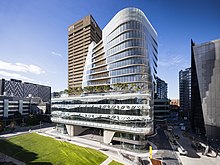UTS: Preparing students for the fifth industrial revolution
Also called the fifth industrial revolution, this new era will see humans leverage the technological gains of Industry 4.0, which was focused on automation, artificial intelligence, Big Data and the Internet of Things, and transform them into human-centred solutions to a vast range of challenges.
As a university of technology, UTS is uniquely placed to prepare students for these new horizons.
“Industry 4.0 was human-less,” says Professor Peter Ralph, Director of the UTS Climate Change Cluster (C3), a leading sustainability research centre.
“In 5.0, we’ll take what we learnt from 4.0 and refine it, making it more fit-for-purpose for the post-COVID, climate-damaged world. Humans will play a key role in transforming 4.0 systems for the new world, taking the good parts of automation and disposing of the bad.”
At C3, Professor Ralph and his colleagues are doing just that. Building on early findings from the Industry 4.0 Algae Testlab, a bio-manufacturing facility based at the UTS Tech Lab, they’re exploring new opportunities for the production of algae-based bioplastics, food and cosmetics. This combination of human ingenuity and technology to achieve better outcomes for people and the planet is the hallmark of Industry 5.0.
Industry 4.0 was human-less. Humans will play a key role in transforming 4.0 systems for the new world, taking the good parts of automation and disposing of the bad.
Professor Peter Ralph
Executive Director, UTS Climate Change Cluster (C3)
In fact, tech-integrated innovation is set to emerge in almost every UTS faculty, including those not always associated with industrial innovation. Another example is in the UTS Business School, where learners are investigating the impact of AI and Big Data on shaping customer service and digital strategy.
“Industry 5.0 is about moving forward to a more sustainable hybrid model that synthesizes the strengths between machine intelligence and human intelligence,” says TaeWoo Kim, a lecturer in the Business School’s Marketing Discipline Group.
“Many courses at the UTS Business School, including mine, aim to prepare the students to live in a world in which symbiosis with machines will be daily occurrence.”
At the recently launched Centre of Excellence in Sustainable Fashion and Textiles, a partnership between UTS and TAFE NSW, staff and students will use advanced manufacturing techniques and the latest advances in fabrication, cutting and production to produce fashion outcomes that are good for industry, workers and the environment.
Over in the Faculty of Arts and Social Sciences, a new Criminology program is challenging students to work with the latest forensics technologies to fight crime in the 21st century.
“The skills that we develop and champion – such as communication, cross-cultural literacy, and critical analysis – will become even more important as our workplace settings merge with the incredible power of AI and Big Data,” says Associate Professor Susie Khamis, a lecturer in Public Communication.
“Our students will work with the awesome potential of digital technologies and assume a command position in their positive deployment.”

